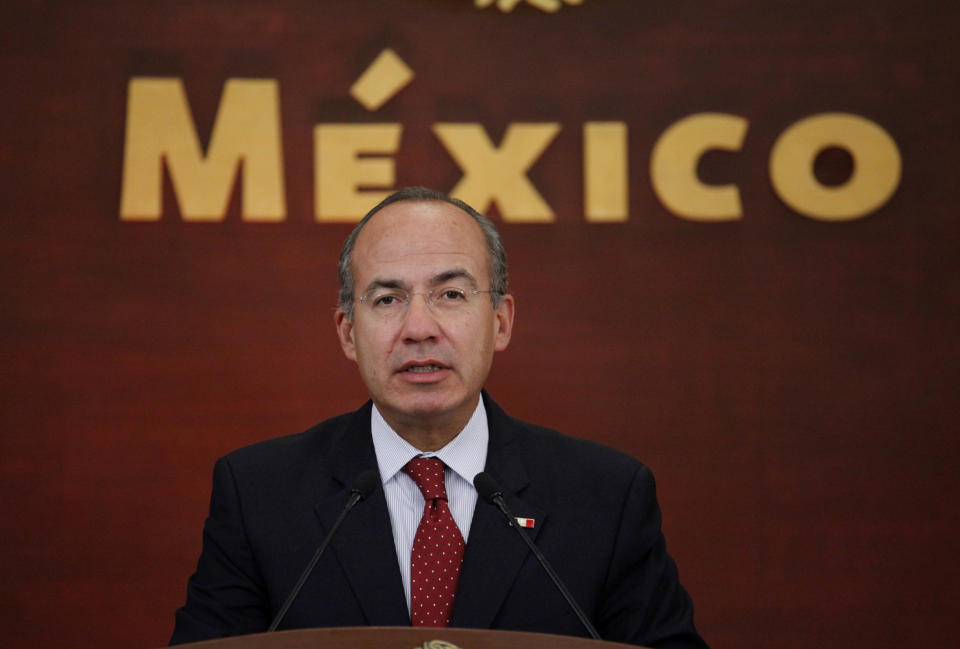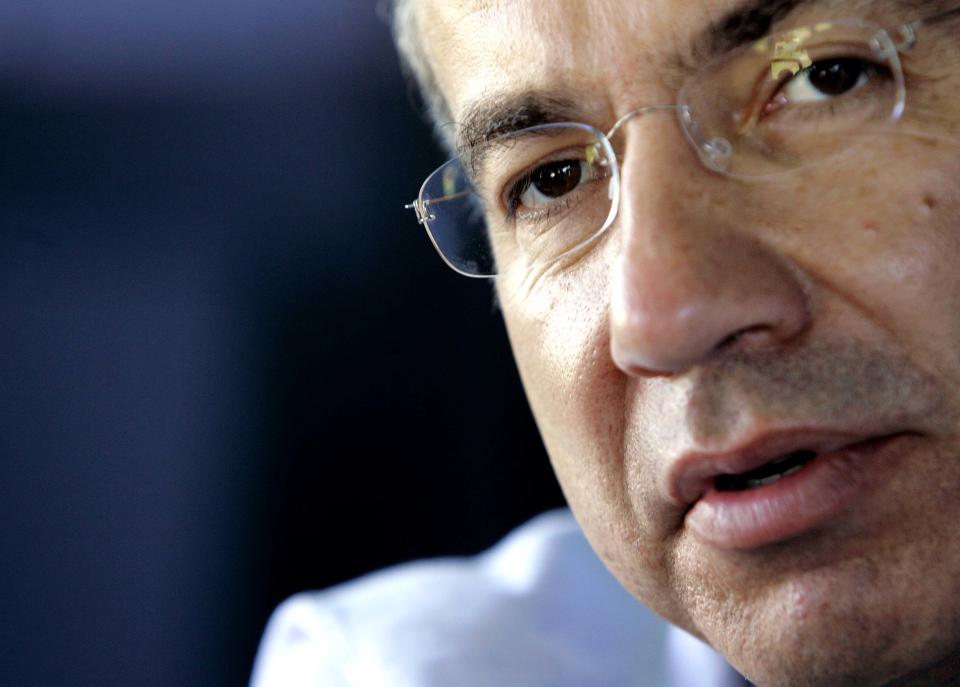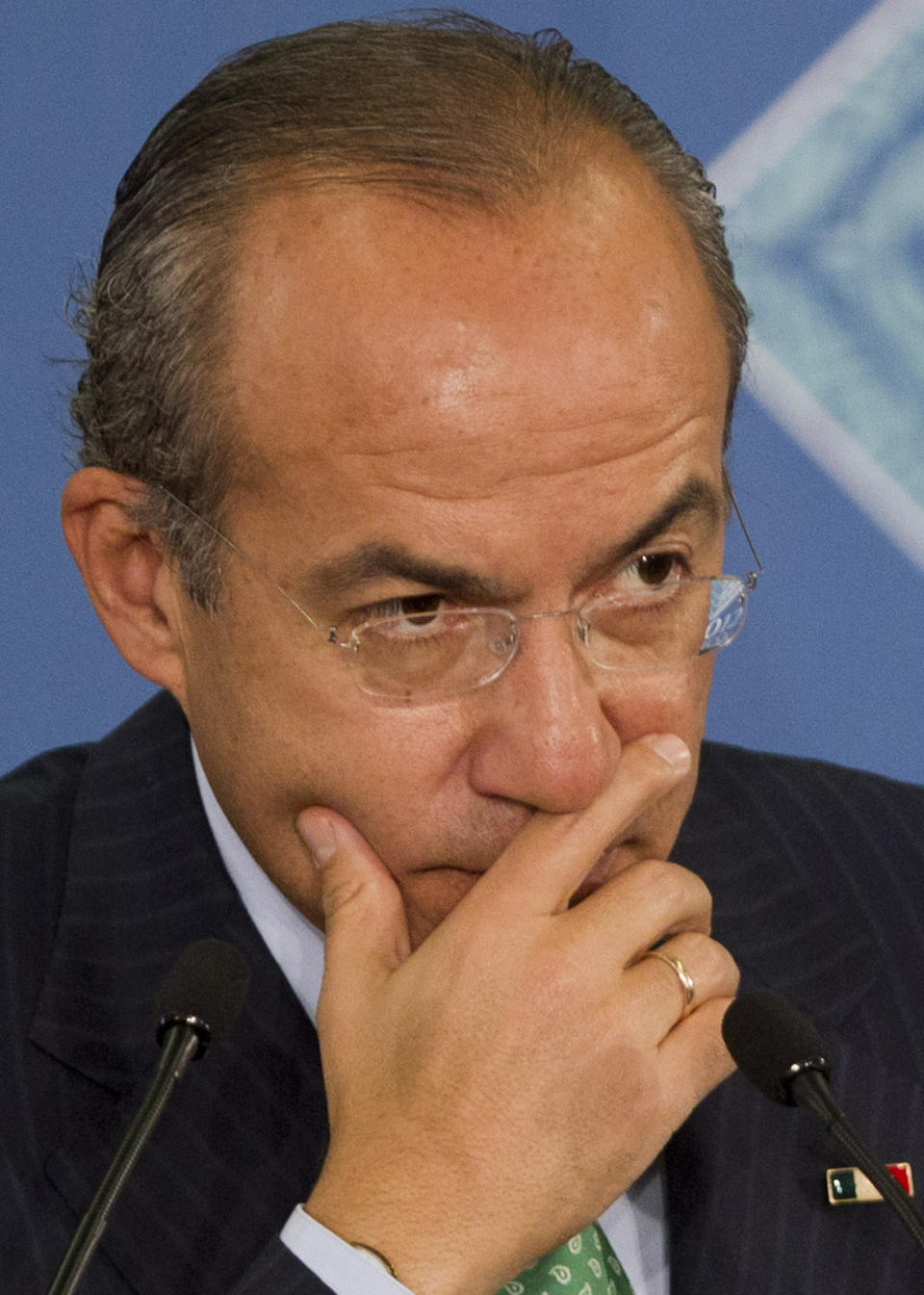Mexico's President Calderon fell short of goals
MEXICO CITY (AP) — When he came to power six years ago, President Felipe Calderon set goals to alleviate poverty, create jobs and increase public safety.
As he winds up his term at the end of this week, Calderon leaves Mexico with fiscal stability that saved the country from collapse during the world's economic crisis, but with far greater violence, very little change in poverty levels and anemic job growth.
His National Action Party, or PAN, was considered the hope for a new democracy when his predecessor, Vicente Fox, defeated the Institutional Revolutionary Party after 71 years of rule. Now Calderon is handing the presidency back to the Old Guard party known as the PRI, and with it a country deeply divided about where Mexico is headed.
As one of his final acts, he proposed to drop the name "United States" from the United States of Mexico.
"After six years of exercising power and the country not changing for the better, he decided he could at least change the name," columnist and historian Lorenzo Meyer chided in Thursday's Reforma newspaper. "Nice going!"
A very formal man in public, Calderon was said to keep a tight circle of like-minded confidants and had little trust in outsiders. Although he operated under Mexico's old presidential model of a quasi-monarch, Calderon didn't have the power to order change under the country's new democratic government. He was commonly described as stubborn, with some even calling him a zealot, especially in his crusade against organized crime.
But he was known to loosen up when speaking about Mexico's international triumphs in sports and about tourism, even spelunking and riding a zip line in the name of promoting his country as a great place to visit.
He is also widely lauded for keeping Mexico from crashing during one of the worst global economic crises in history.
"If there is something we can applaud about 12 years under the PAN it's the economic discipline that kept us on the margins of a major crisis," said pollster Roy Campos. "We were shielded and we're ready to grow."
Indeed, Calderon leaves office Saturday amid international media buzz about Mexico's potential growth over the next few years, mainly because of its already booming manufacturing sector. But international economic organizations, including the International Monetary Fund, say Mexico still lacks the necessary reforms to energy, tax structure and other institutions to increase productivity and growth.
Calderon tried to pass such reforms but was unsuccessful in a divided congress, save for a labor reform he signed Thursday. It was passed with the help of the PRI and President-elect Enrique Pena Nieto, who was elected July 1 by a comfortable margin. Calderon could not be re-elected under Mexican law that allows for only single presidential terms.
The outgoing leader also did little to change transparency or rule of law. The government office to fight corruption was run by a political appointee rather than an investigator. His judicial reform for open trials based on evidence has barely been implemented four years after it was first approved.
Even some of his own government statistics don't make him look good. When Calderon took office in December 2006, about 43 percent of the population lived in poverty, earning less than $100 month. In the most recent government measure, 2010, that had increased to 46 percent, a fall many blame on the economic crisis and rising food prices. No newer government figures are available.
In late 2006, Mexico had 13.6 million formal jobs. By last month, that had grown to more than 16 million, with more than 2.6 million new formal jobs added over six years. While an improvement, that's nowhere near the estimated 6 million Calderon's government needed to create to meet the demand of an expanding working-age population that grows by about 1.2 million people a year.
Meanwhile, homicides over the course of the six-year term totaled 101,199, about 36 percent higher compared to those of the previous administration, according to a report by the private research center Mexico Evaluates.
Analysts, including security expert Eduardo Guerrero's Lantia consulting firm, estimate that 60,000 of those killings were linked to organized crime, though the government stopped counting at 47,500 more than a year ago.
Calderon has argued that he had a legal and moral obligation to launch a counterattack on drug traffickers who were becoming increasingly more violent and seeking to control territories and even authorities.
"History will judge and remember those who fought for a free Mexico, free from the yoke of crime and delinquency," Calderon said on November 20 during the 102 anniversary of the Mexican Revolution, a key event in the nation's history.
The president did not respond to repeated requests by The Associated Press for an interview.
Many think Pena Nieto will abandon the strategy of going after cartel leaders in favor of a focused effort to reduce murder, extortion, kidnapping and other common crimes affecting everyday people.
On Wednesday, alleged messages from the criminals themselves seemed to mock Calderon's effort.
The Knights Templar cartel, which still controls the territory where Calderon launched his war in his home state of Michoacan, hung a banner to wish the outgoing president Merry Christmas and to urge him to get to know the cartel, "some fine, well-intentioned people."
"You can count on us," it said.
Imprisoned drug lord, Edgar "La Barbie" Valdez Villareal, allegedly sent letters to various media accusing Calderon of sending a top general to negotiate with cartels.
The authenticity of either message could not be confirmed by the AP.
In recent speeches Calderon has lamented that his attack on organized crime and the subsequent spike in violence has overshadowed his other accomplishments. He counts among his main achievements the expansion of health insurance through Seguro Popular, which covers people unaffiliated with any other plan, a number that grew from 15 million to 50 million during his six years.
His government has built 12,600 miles (21,000 kilometers) of new roads and bridges, more than the last administration. International reserves exceed $160 billion, a record. Oil production, recently in decline, has stabilized at about 2.5 million barrels daily. Calderon said Mexico six years ago was the ninth largest exporter of cars and now is the fourth.
Still, the economic reviews are mixed.
The world financial crisis of 2008 particularly affected Mexico in Latin America, because of its close economic ties to the U.S. The country in 2009 saw economic growth drop by 6 percent, one of the worst declines in Mexico's history. Per capita growth nearly rebounded in 2010, but has fallen short of expectations of about 4 percent annually since then.
Many laud Calderon for what didn't happen.
"Unemployment, poverty and inequity didn't plummet to extremes," said Nicolas Loza of the Latin American Faculty for Social Sciences in Mexico City. "The ship stayed afloat."
But not everyone agrees.
Between 2006 and 2011 the economy had an average growth of about 1.6 percent, one of the worst in Mexico's recent history, said Jose Luis de la Cruz, who runs the Economics and Business Research Center at the Technological Institute of Monterrey.
By comparison, average growth was 2.2 percent under Vicente Fox and 3.5 percent under his predecessor, Ernest Zedillo, the last member of the PRI to hold the presidency. The U.S. has averaged 3 percent annual growth over the last several decades.
"They always mention the famous macroeconomic stability as one of his major successes," De la Cruz said. "In reality the problem is that in spite of that, there is an environment of low economic growth."



